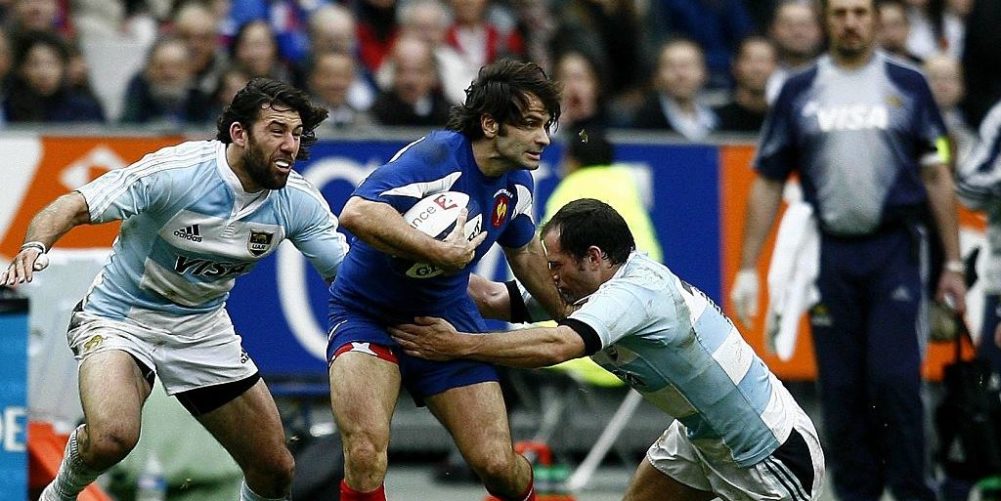Shortly before three o’clock last Tuesday afternoon, Christophe Dominici climbed some 20 metres onto the roof of a disused army barracks and fell to his death.
That he chose a historic building on the edge of a national park famous for its panoramic views of Paris below seemed somehow to make his apparent suicide all the more tragic given the natural beauty of the setting. The Domaine National de Saint-Cloud has been a French treasure since the Middle Ages.
It is famous for Marie Antoinette’s rose garden which she made more than 200 years ago during her reign as the last Queen of France; for Napoleon’s Palace destroyed during the Franco-Prussian war in 1870 and the Sully Barracks built some 50 years earlier by King Charles X.
What drove one of the best-loved French players of the professional era to end it all at the age of 48 will probably never be known and yet some who knew him as a troubled soul from the days of his pomp feared for him.
‘Domi’ had been fighting his demons virtually since childhood. As the tributes flowed from friends and former teammates, one word seemed to keep recurring: fragility.
“He was very confident but also very fragile,” said Max Guazzini, the flamboyant former owner of the revolutionary Parisian club Stade Francais with whom Dominici won five Top 14 titles. “We must remember the 1999 World Cup semi-final against the All Blacks.”
On the rugby field in general and that day in particular, nobody questioned his courage, mentally or physically. Those of us who were there at Twickenham that Halloween Sunday 21 years ago to witness the greatest World Cup match staged on this side of the Equator will never forget how France, 10-24 down to the All Blacks at half-time, found the nerve to score 33 unanswered points and win 43-31.
During the break, Dominici was the one who dared to believe they had the Kiwis on the run.
“I have looked into the eyes of Jonah Lomu,” he told the team at half-time. “They are shit scared of us.”
A rapid volley of four goals from the prodigious Christophe Lamaison had taken France to within two points when the mercurial Dominici put his words into deeds with the try which opened the floodgates. And to think he had suffered what he later described as a panic attack on the morning of the match.
The acclamation of those who had done the impossible seemed to ring louder and last longer for the little fellow on the right wing.
“After the 1999 World Cup, I was caught in a kind of media whirlwind,” Dominici wrote in his autobiography. “It turned into a downward spiral.”
That was a time when, by his own admission, he went 25 days without sleep and ended up in hospital. His marriage dissolved and then there were other traumas, like the loss of a close friend who had reportedly been shot nine times.
“Christophe always seemed to be close to the edge,” a French colleague told me yesterday. “We once had a conversation and for about 30 minutes he talked about the soul, the spirit and the body. I thought: ‘My friend, you are not well’.”
Before deciding that his greatest moment put him on the tortuous path to that rooftop last week, it is worth considering that Dominici had suffered from depression since adolescence. He traced it back to a family tragedy. At the age of 14, his sister Pascale, ten years older, was killed in a road accident. Dominici would be forever haunted by her death. “When she died I went into self-defence,” he recalled. “I resented the whole world. Pascale helped me with my homework and taught me to dance.
“The blues of my childhood always caught up with me. I feel like I am naked, helpless. I plunge into melancholy. I give free rein to my self-destructive ideas.
“I think I am going to die, suffocated or crushed under an invisible weight. I cannot stand up. I stay in bed for days curled up like a foetus.”
Another story from his childhood turned out to be wonderfully prophetic, of how a wing of Dominici’s short stature could still reach the top in a sport then in the act of being hijacked by muscle-bound giants.
“My mother saw a medium and the clairvoyant told her that her son had a gift,” he said. “My mother convinced herself that this ‘gift’ was rugby. She kept telling me: ‘You will be in the French team, my son.’
“And I said: ‘But, mom, you made me a dwarf. Why do you want me to be in the French team with my 1.72m (5ft 7ins) and my 68 kilos (10st 8lbs) when there are guys who have arms like thighs and thighs like trees?”
Dominici, whose parents ran a flower and vegetable business near Toulon, left school two years later, and despite his physique, or lack of it, rose from nowhere to the biggest stages the game had to offer, scoring on debut at home to England on a cold winter’s day at the start of the 1998 Five Nations. His advent was like a meteor streaking across the sky above the Stade de France.
He played the last of his 67 Tests in 2007 when the hosts failed almost as utterly at their own World Cup as England would do at theirs eight years later. He dabbled in various business ventures, most recently as the front man for a business consortium in the United Arab Emirates attempting to take over Beziers.
Dominici spoke enthusiastically about the imminent restoration of a dominant force from the 1970s when Bezier’s pack of hardmen made France a terrifying force. He talked of contracts being drawn up to sign Australia wing Marika Koroibete and a host of other superstars.
But the project ended in mid-summer with the Ligue Nationale de Rugby ruling that the financial guarantees were not sufficient. Friends feared that the rejection would leave Dominici distraught at the damage to his reputation.
To what extent that drove him to jump from the roof of the vacant Sully Barracks, only Dominici knows. He leaves his partner, Loretta, daughters Chiara and Mya as well as a short sentence from his autobiography: ‘Rugby saved me’.
Maybe it saved him from going off the rails in his late teens but, tragically, nothing could save him from the darkness deep within his soul. That rugby might have flipped him over the edge would be the cruellest irony of all.























